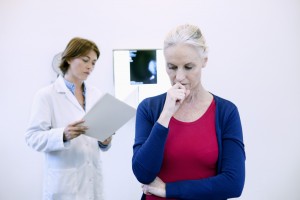
Diagnosed with Cancer? Your two greatest challenges are understanding cancer and understanding possible side effects from chemo and radiation. Knowledge is Power!
Learn about conventional, complementary, and integrative therapies.
Dealing with treatment side effects? Learn about evidence-based therapies to alleviate your symptoms.
Click the orange button to the right to learn more.
Reduce Your Risk of Cancer NOW!

All I could think of were evidence-based but non-conventional therapies to reduce the risk of cancer. Several classmates of mine and I were playing poker the other night. As is often the case, the general topic of cancer came up in conversation.
After all, we are in our sixties and men our age begin to worry about cancers such as prostate cancer. None of us can sleep the entire night without getting up at least once to take a leak.
Large organizations such as the American Cancer Society (ACS) would like to you believe that oncology is making great advances in the treatment of all cancers. Unfortunately, this is simply not the case.
In my experience, there are great strides in many specific area in the world of cancer such as diagnostics. There may even be individual cancers that have changed for the better. The most obvious case, of course, is lung cancer. Because smoking cigarettes is down in the United States, there has been a drop in lung cancer cases.
Being a long-term cancer survivor myself, I knew two things:
- Healthy people do not want to talk about cancer and
- Healthy people do not want to talk about the very evidence-based therapies below, that reduce the risk of cancer.
Here’s my problem. I know how a cancer diagnosis can ruin your life. Also, I
What are some ways to reduce my risk of cancer?
- Maintain a Healthy Weight: Being overweight or obese increases the risk of several types of cancer, including breast, colon, prostate, and pancreatic cancer. Aim for a balanced diet and regular exercise to maintain a healthy weight.
- Eat a Healthy Diet: Focus on eating plenty of fruits, vegetables, whole grains, and lean proteins. Limit processed foods, red meat, and sugary beverages. Choose a variety of colorful fruits and vegetables to ensure you get a wide range of nutrients and antioxidants.
- Be Physically Active: Regular physical activity can help reduce the risk of cancer. Aim for at least 150 minutes of moderate-intensity exercise or 75 minutes of vigorous-intensity exercise each week.
- Limit Alcohol Consumption: Excessive alcohol consumption is linked to an increased risk of several cancers, including breast, liver, and colorectal cancer. Limit your alcohol intake, and if you choose to drink, do so in moderation.
- Quit Smoking: Smoking is one of the leading causes of cancer. Quitting smoking can significantly reduce your risk of developing lung, throat, and other cancers. Seek support from healthcare professionals or smoking cessation programs if needed.
- Protect Yourself from the Sun: Protect your skin from the harmful effects of ultraviolet (UV) radiation by wearing sunscreen, protective clothing, and seeking shade when outdoors. Avoid indoor tanning beds, as they also increase the risk of skin cancer.
- Get Vaccinated: Vaccines can help prevent certain types of cancer. For example, the human papillomavirus (HPV) vaccine can protect against cervical, anal, and some head and neck cancers, while the hepatitis B vaccine can reduce the risk of liver cancer.
- Screening Tests: Participate in cancer screening programs as recommended by your healthcare provider. Regular screenings can help detect cancer at an early stage when it’s more treatable.
- Know Your Family History: Some cancers have a genetic component. Know your family’s cancer history and discuss it with your healthcare provider to determine if you may be at increased risk and if additional screening or preventive measures are necessary.
- Manage Stress: Chronic stress can weaken the immune system and may contribute to the development of cancer. Practice stress-reducing techniques such as mindfulness, meditation, yoga, or hobbies that you enjoy.
The list above doesn’t include therapies like less red meat and lots of fruit and veggies but I list the basics which is a good way to start.
If you have been diagnosed with a form of pre-cancer such as DCIS, MGUS/SMM, colon polyps, melanoma in-situ, Barrett’s Esophagul or GERD, and you would like to learn more about evidence-based non-conventional therapies to reduce your risk of advancing to full cancer let me know- David.PeopleBeatingCancer@gmail.com
Hang in there,
David Emerson
- Cancer Survivor
- Cancer Coach
- Director PeopleBeatingCancer
An estimated 35 million new cancer cases to occur in 2050, WHO warns
- “The latest report from the World Health Organization predicts that there will be over 35 million new cases of cancer in 2050, a significant rise from the approximate 20 million cancer cases that occurred in 2022.
- Reports from the International Agency for Research on Cancer found that lung, breast, and colorectal cancers are the most common types worldwide.
- The data point to several factors contributing to cancer cases and allows for exploring mitigation and prevention strategies…
Cancer cases are rising, but what types and where?
Certain cancer types are more common, and some carry an overall higher mortality rate worldwide. IARC collects data on these numerous areas to help create a more complete picture of the effects of cancer, allowing for brainstorming strategies to address the problem.
According to one of the IARC reports worldwide, the top three most common cancers in 2022 were
- lung
- breast and
- colorectal
Among men and women, lung cancer accounted for 12.4% of all cancer cases…
Among men, the top three most common cancers were
- lung,
- prostate, and
- colorectal.
Among women, the top three most common cancers were
- breast,
- lung, and
- colorectal,
with breast cancer accounting for 23.8% of all new cancer cases among females in 2022…
Factors contributing to rising cancer cases
Environmental factors and lifestyle choices also contribute to cancer’s impact. For example, the WHO statement suggests that the increase in lung cancer cases is related to the continued use of tobacco in Asia. They also note that the data reflects increases in the aging population and population growth.
Alcohol use, tobacco use, and obesity continue to contribute to cancer rate increases overall. Exposure to air pollution is also a likely contributing factor…
Mitigation and prevention strategies
People can also take steps at the individual level to cut down on personal risk factorsTrusted Source. For example, people can quit smoking to help decrease their risk for several cancer types.
They can also seek to follow a balanced diet, maintain a healthy weight, and limit alcohol use. They can further discuss their doctor’s recommendations for cancer screening and follow-up…
“The report names lung, breast, and colon as the three major cancer types in 115 countries including the [United States,” she told us. “These are three cancers for which we know prevention-focused behavioral changes and screening can significantly decrease cancer morbidity and mortality.”
“Stopping tobacco use, maintaining a healthy weight, eating nutritious meals and being active are key ways that people can reduce their risk of getting cancer. It’s also important to keep up with regular screenings, such as mammograms for breast cancer, colonoscopies for colorectal cancer and PSA testing for prostate cancer,” Dr. O Ntiri advised…”


